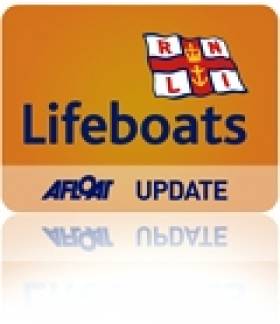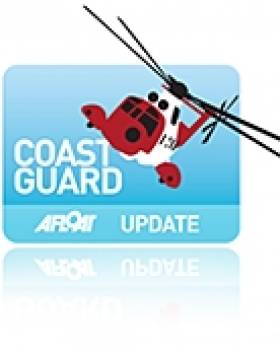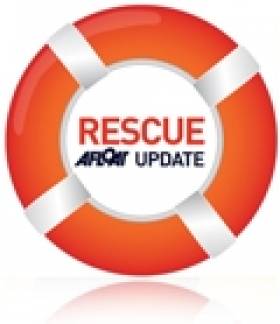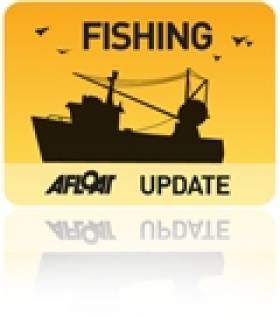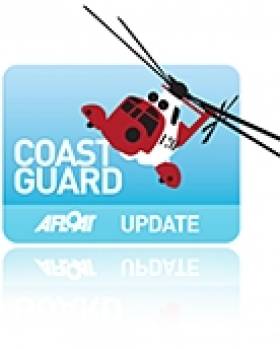Displaying items by tag: Medevac
Baltimore Lifeboat Tasked With Medevac From Cape Clear Island
Baltimore RNLI received an an alert from Valentia Coastguard at 09:29 this morning when a young boy in urgent need of medical attention required immediate evacuation from Cape Clear Island.
Coxswain Aidan Bushe along with 5 volunteer crewmen were launched within minutes of the alert. They proceeded in poor weather conditions to the North Harbour of Cape Clear Island against a swell of 3 metres and force 6-7 northwest winds.
When the lifeboat crew arrived at the pier the little boy was unresponsive. He was immediately stretchered aboard the the lifeboat where he was constantly monitored on the journey back to Baltimore. The lifeboat arrived at Baltimore pier at 10:30, from where the boy was transferred to Skibbereen for medical attention.
The evacuation was successfully completed in one hour, a remarkable achievement given that current weather conditions have meant frequent cancellation of local ferries.
On board were ; Coxswain Aidan Bushe, Mechanic Cathal Cottrell, crew Sean McCarthy, Jerry Smith, Ronnie Carty and Don O'Donovan
Derry–Londonderry–Doire is diverting to Hobart in Tasmania for a medevac of an injured crewman as a precautionary measure.
Skipper Daniel Smith contacted the Race Office at 1030 AEDT today (2330 UTC Tuesday 8 December) to report that round-the-world crew member Michael Gaskin, 54, from the West Midlands, UK, had sustained suspected broken ribs after he fell by the helming position when a wave broke over the back of the yacht in rough seas and 35 knots wind, approximately 130 nautical miles to the southwest of Tasmania.
Team Medics Ali Boeree and Jan Chatzis administered first aid while the Skipper contacted ClipperTelemed+, the Clipper Race remote telemedicine service. Doctors at the Praxes operations centre in Halifax, Canada, confirmed diagnosis and directed the provision of pain relief and anti-nausea medication.
Due to the proximity of Hobart and the rough conditions, the Skipper has decided to divert as a precaution so that Michael can be treated ashore. The team will continue the race to Sydney once Michael has been transferred to hospital.
“The Skipper reports that Mike is in a stable condition and is receiving pain relief,” explained Race Director Justin Taylor. “The conditions were quite challenging at the time. Mike was clipped on behind the high side helm. The low side helm took over to allow Mike to step in. A breaking wave broke over the side of cockpit and Mike says he hit the pushpit and heard his ribs crunch. He was then washed into the A frame and sustained a small cut to his head. He was stopped by his safety tether. This was the first breaking wave into the boat the team had experienced, although they had a lot of spray.”
Water breaking over the deck is very powerful. A cubic metre of water weighs a metric tonne.
This is the first medevac of the Clipper 2015-16 Round the World Yacht Race, the tenth edition of the biennial global series, the world’s longest ocean race at more than 40,000 miles, taking 11 months to race between six continents. Only a handful of the 3300 amateur sailors who have participated over the last 19 years have had to be evacuated, the majority as a precaution following medical treatment aboard.
Michael’s next of kin has been informed. Everyone else aboard is safe and well.
Michael is an experienced yachtsman, holding a Day Skipper qualification and had previously sailed around Scotland, the Mediterranean and Indian Ocean.
The yacht is estimated to reach Hobart around 1000 AEDT tomorrow (Thursday) morning 10 December (2300 UTC 9 December).
Coastguard Choppers Fight Storm Desmond In Medevac Off Southwest Coast
#Rescue - Two Irish Coast Guard helicopters battled Storm Desmond to evacuate a crewman from a container ship off the southwest coast yesterday (Friday 4 December).
As UTV News reports, Rescue 117 from Waterford was joined by Rescue 115 from Shannon in the medevac some 160km west of Fastnet Rock at the Swedish-registered MV Atlantic Cartier, where the long-range-specialist Sikorsky S-92 helicopters faced strong gales and heavy seas.
According to TheJournal.ie, the ill crewman, who was reporting chest pains, was airlifted to Cork Airport where he was transferred to an ambulance.
It marks the latest rescue operation for the coastguard helicopter network in a busy 2015, which has seen a record year for Sligo's Rescue 118 in particular.
Second Island Evacuation In Fortnight For Clifden RNLI
#RNLI - Clifden RNLI's all-weather lifeboat Pride and Spirit was launched shortly after 4pm on Tuesday (24 November) to undertake an urgent medical evacuation from the island of Inishturk North.
This was the second such callout in a fortnight, after a medevac from Inishbofin on 15 November, with severe weather conditions once again facing the volunteer crew, who have had a busy year to date trialling the Mersey-class lifeboat.
With winds blowing north-west Force 7 to 8 and a swell warning issued by Met Éireann, a round trip of almost 50 nautical miles was required to bring the casualty to shore for urgent medical attention.
"The swell was over five metres at times and it took us around an hour and 45 minutes to reach the island," said Clifden RNLI coxswain John Mullen, "but thankfully the Pride and Spirit is well equipped for such conditions.
"We brought the casualty into Cleggan Harbour shortly after 7pm and would like to wish her a speedy recovery."
The volunteer lifeboat crew consisting of Owen Hayes (navigator), Robert King (mechanic), David O Reilly, Daniel Whelan and coxswain Mullen returned to Clifden Bay shortly before 9pm.
Early Morning Island Medevac by Clifden Lifeboat
#RNLI - The crew of Clifden RNLI had an early start in dark and dangerous conditions yesterday morning (Sunday 15 November) when an emergency medical evacuation was required from Inishbofin.
After a 5.43am pager alert, the volunteer lifeboat crew consisting of Alan Pryce, Robert King, David Barry, Daniel Whelan, Brian Ward and David Coyne set out for the island in the all-weather lifeboat Pride & Spirit.
Clifden RNLI deputy launching authority Saul Joyce described the conditions at the time as "extremely challenging and certainly the most severe weather the crew have experienced in the all-weather Mersey class lifeboat to date."
On arriving at Inishbofin Harbour, the crew met with the district nurse who helped transfer the casualty onto the waiting lifeboat. The patient, a woman experiencing severe abdominal pain, was then taken by lifeboat to Cleggan where an ambulance was waiting.
Clifden RNLI coxswain Alan Pryce said of the launch: "With winds consistently Force 8 and above at times and a heavy five- to six-metre swell, this proved a challenging call for our crew, particularly setting off in darkness. We wish the patient a speedy recovery."
Baltimore Lifeboat In Medevac From Cape Clear Island
#RNLI - Baltimore RNLI's lifeboat was launched at 11.38pm last night (Saturday 11 July) to convey a sick teenager from Cape Clear Island to Baltimore.
The teen, who was suffering from an appendicitis, was transferred from the island aboard the lifeboat Alan Massey to Baltimore Lifeboat Station, from where an ambulance brought her to hospital in Cork.
Equipment was then cleaned and stored, and the lifeboat was ready for service again by 1.10am.
The crew were Kieran Cotter, Pat Collins, Jerry Smith, Don O'Donovan, Colin Whooley, Sean McCarthy and Mícheál Cottrell. Shore helpers at the station were Brian McSweeney, Aidan Bushe and Youen Jacob.
Coastguard Airlifts Injured Fisherman In Atlantic Drama
#Coastguard - Waterford's Rescue 117 helicopter evacuated a fisherman with a crush injury to his leg from a trawler some 180km off the Irish coast yesterday afternoon (Wednesday 29 April).
The Irish Independent has dramatic video of the Irish Coast Guard medevac operation south-west of Kinsale, recorded by an Air Corps Casa as it provided search and rescue cover.
The fisherman was later transferred from Cork Airport to Cork University Hospital for treatment.
Second Russian Fishing Vessel In A Week Requires Medevac
#Rescue - Irish Coast Guard helicopter Rescue 115 was dispatched yesterday morning (18 February) for a medevac of an injured fisherman.
As the Irish Independent reports, the casualty was on a Russian fishing vessel some 200 miles off the southwest coast, heading towards Castletownbere.
The operation comes just a week after another Russian crewman was airlifted from a factory ship off Cork after sustaining a hand injury.
The latest incident is believed to relate to a bleeding ulcer, and the casualty was expected to be transferred to the mainland for treatment by yesterday afternoon.
Medevac For Skipper Of Trawler Off Dingle
#Fishing - A fisherman with a suspected case of appendicitis was airlifted from a trawler off Dingle yesterday, as the Irish Independent reports.
Valentia coastguard co-ordinated the medevac of the skipper of the fishing vessel Ellie Adhamh, which was some 120 miles off the Kerry coast when be took ill.
The rest of the trawler's seven-man crew were expected to return to port in Castletownbere in West Cork this morning.
#Coastguard - The HSE has been criticised for deploying two Irish Coast Guard helicopters to the Aran Islands for injured woman who could have been transported to hospital by a commercial flight.
The Irish Times reports that the HSE West has defended its actions in deploying successive rescue helicopters to airlift the elderly tourist as part of the coastguard's air ambulance service, despite the Inis Mór GP who treated her broken ankle describing the injury as not serious.
But the National Ambulance Service does not have a contract with Aer Arann, which operates commuter plane flights in the islands, necessitating a medevac by coastguard helicopter at an estimated total cost of €7,000.
The Irish Times has more on the story HERE.



























